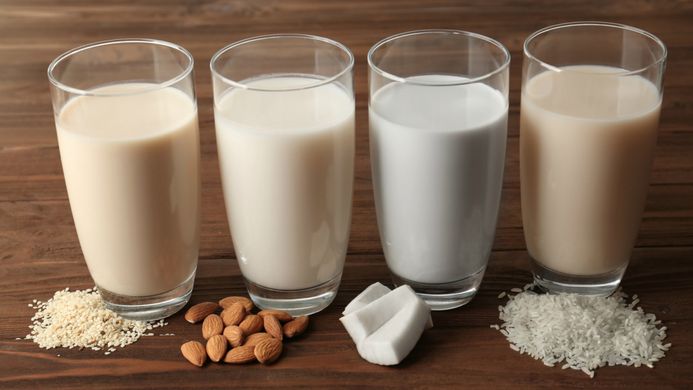
How well do plant based alternatives fare nutritionally compared to cow’s milk?
Published to Latest News on Oct 01, 2021
Intolerance to proteins such as casein. or sugars such as lactose in cow’s milk, plus an increasing trend towards vegetarianism and veganism, has prompted the food industry to introduce a range of plant-based alternatives to cow's milk. Although they are now popular alternatives to cow’s milk, they have different nutrient values and may have varying benefits for health. A 2018 study, published in the Journal of Food Science Technology compared cow’s milk to almond, soy, rice and coconut milks.
Cow’s milk acts as a complete food providing all the major nutrients: fat, carbohydrates and proteins. Researchers have shown that the consumption of bovine milk can help the human body by providing a wide range of protective proteins. The nutrient content of almond, rice, coconut and soy milks can differ quite significantly between different brands. Some have added sugar, salt, and preservatives. These additions may alter the carbohydrate content and the calories in the milk. Some plant-based milks are fortified with minerals and / or vitamins. People using plant-based milk products should be aware there may be fewer calories, macro- and micro-nutrients than in cow's milk and should make up these nutrients in other areas of the diet. This is particularly important for children.
Soy milk has been used as a substitute for cow’s milk for over four decades. Its nutrient content is comparable to that of cow's milk in terms of calories and balanced nutritional profile. It is very rich in proteins and fat with a higher content of monounsaturated and polyunsaturated fatty acids (MUFAs and PUFAs) compared to saturated fats.
The seeds contain up to 35–45% protein and 20% fat and can act as an important source of protein especially in people following a vegetarian or vegan diet. Some brands were found to be deficient in methionine, an essential amino acid, due to the manufacturing process used. If a person does not obtain enough additional methionine, calcium, and vitamin D, soy milk may be a poor substitute for cow's milk.
Although providing beneficial antioxidant isoflavones, the presence of anti-nutrient factors (trypsin inhibitors, lectins, phytic acids and indigestible oligosaccharides) in soybean and various soy products has been a concern; different manufacturing processes may reduce the presence of anti-nutrients and enhance the nutritional value of soybeans. Soybean allergy is one of the more common food allergies, especially in babies and children (www.foodallergy.org/common-allergens/soy-allergy). There is also the factor that not everyone enjoys its ‘beany’ taste. It is considered that these factors contributed to the decline in its consumption as almond milk rose in popularity.
Almond milk’s popularity has been boosted by the health benefits of raw almonds, being an excellent source of protein, essential fatty acids, vitamins, fibre and antioxidants. Many people find the taste of almond milk more agreeable than that of soy milk. Compared to almond milk, in some cases, the taste of soy milk may come through more strongly in cereals, drinks, or cooking. Almond milk has high levels of monounsaturated fatty acids (MUFAs), which may be beneficial to help with weight management. The researchers point to studies identifying MUFAs as being helpful in the reduction of the body’s low-density lipoproteins (often referred to as ‘bad cholesterol’). Almond milk is low in calories and protein compared to cow’s milk and soy milk.
The general method of preparation involves soaking ground almonds with water. The milky white liquid is obtained after the solids are filtered (solid content depends on the nut and water ratio). In commercial processing, this liquid is generally homogenized using high pressure and then pasteurized to increase the stability and shelf life. Studies have indicated that the homogenization and heat treatment of almond milk can result in deviations within the physical properties of the product in terms of particle size and viscosity. Some manufacturers add carrageenan as a thickener for non-fat foods and dairy replacements, including almond milk; carrageenan may cause side effects such as digestive disturbances, ulcers, and inflammation.
Rice milk is a suitable alternative for individuals suffering from lactose intolerance and / or with allergy issues caused by soybean and almonds. It is prepared by mixing brown rice (generally milled) with water. Being carbohydrate-based, rice milk contains more sugar than cow’s milk. The processing leads to the breakdown of carbohydrates into sugars, giving rice milk its characteristic sweet taste. Rice is a very poor source of proteins and fat as starch is the main source of almost all of its energy.
Research has demonstrated that consumption of rice milk as an alternative to cow’s milk without proper care can result in malnutrition, especially in the case of infants because of the varied difference in the nutrient profile. Concern has been expressed by UK dieticians at the arsenic levels found in rice milk, advising its unsuitability for infants and young children.
Coconut milk is unique compared to the other milks discussed as the total number of calories is less. The majority of these calories come from saturated fats as it contains virtually no protein and can be as low as 0.75 g of carbohydrates compared to 4–5 g of fats. Various researchers have reported that consumption of coconut milk can increase the HDL (high-density lipoprotein – often referred to as ‘good cholesterol’) levels, which help in reducing LDL (low-density lipoprotein – ‘bad cholesterol’). Coconut fats provide lauric acid which contributes mostly in raising the levels of HDL cholesterol.
Due to their limited availability, coconuts are mainly exported in the form of canned products. Researchers who analysed the changes in the thermally processed canned coconut milks (121°C for 5 min) during storage found that as the storage period crossed 2 months, the concentrations of short and medium chain fatty acids and other components like aldehydes increased due to lipid oxidation. Thus, increased storage time can result in reduced nutritional value of coconut milk.
The conclusions of the researchers were that nutritionally soy milk is the best alternative for replacing cow’s milk in the human diet. But various issues including the ‘beany’ flavour and presence of anti-nutrients have encouraged people to look for more alternatives, such as almond milk. Though, almond milk also has a balanced nutrient profile and a flavour preferred by many, the nutrient density and the total number of calories are not as rich as that of cow’s milk. Rice milk and coconut milk cannot act as an ideal alternative for cow’s milk because of limited nutrient diversity, but they are the options for consumers who are allergic to soybeans and / or almonds. Further research is needed to understand the effect of various conventional and novel processing methods on the nutrient profile, flavour and texture of these alternatives.
The full research, including detailed nutrient profiles, can be found at https://www.ncbi.nlm.nih.gov/pmc/articles/PMC5756203/
Tags: health
